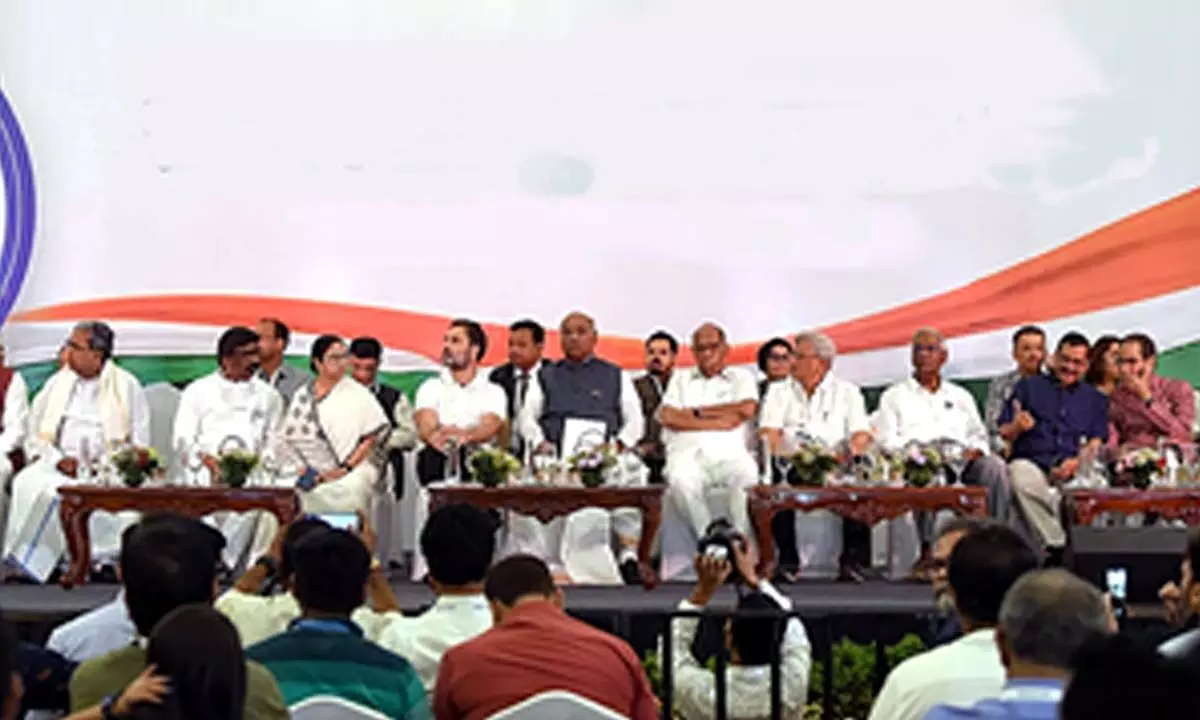INDIA bloc trips over compulsions of regional politics

New Delhi: With a few months left to go for the big polls, it is not difficult to guess in the prevailing scenario the predominant colour the Lok Sabha may have after the elections.
The BJP with Modi at the helm is in its roaring self and the Opposition's INDIA continues to be a bloc of jousting stars who are busy engaged in securing their own forts.
Everything at the moment seems to be going on the right track for the BJP-led NDA. The big win in the Assembly elections in three Hindi heartland states has reassured the saffron brigade of its strategy at the core of which is the consolidation of Hindu votes. Adding to its popularity are the various populist welfare measures that have benefited people across religious and caste barriers.
The fulfilling of the Ram Temple promise is of course the BJP's ultimate exhibit of its guarantee. The grand 'Pran Pratishta' ceremony on January 22 has already created a wave of devotion among Hindus and Ayodhya, with all the development being pushed there, will have a long-lasting impact upon a huge percentage of the people.
The popularity of Prime Minister Narendra Modi is at its peak. He is the best face of the ruling party and is unmatchable in the country. Morning Consult, the US-based consultancy firm, reports in its 'Global Leader Approval Rating Tracker', 76 per cent of people in India approve of PM Modi's leadership.
Dreaming of undoing this is the conglomerate of 28 parties, named the INDIA bloc, which was formed amid much fanfare and with one core mission: to remove Modi from the Centre. Over five months in its existence, the bloc, however, is facing a grave challenge to its existence, and seems to be derailing.
As predicted, the seat-sharing exercise is proving to be difficult for the bloc. The regional parties are throwing around their weight and pushing the Congress to a corner.
The position of the grand old party, which suffered a major blow in the Hindi heartland in the five-state polls, has weakened within the bloc. Its equations within the bloc have changed. The Congress has been projecting itself as the fulcrum of the alliance. But today, the very partners who had endorsed it as the fulcrum are challenging it during the seat-sharing talks.
Be it West Bengal, Uttar Pradesh, Delhi, Punjab, Bihar, or Maharashtra, the Congress is facing a squeeze situation. The JD(U) in Bihar wants 16 seats for itself, the Samajwadi Party does not want to give too many to the Congress in Uttar Pradesh, the AAP seems to have no plans for accommodation in Delhi and Punjab, Mamata Banerjee's Trinamool Congress is categorical in its strategy and in fact has expressed its readiness to go solo.
In Uttar Pradesh, which has the highest number of 80 Lok Sabha seats, the tension within the INDIA bloc, especially between the Congress and the Samajwadi Party, is growing.
The latest stumbling block between the two is the shadow of the Bahujan Samaj Party (BSP).
The Samajwadi Party has stated that it was against the BSP joining the bloc of 28 Opposition parties. State Congress president Ajay Rai, on the other hand, is said to have urged BSP President Mayawati to seriously consider joining the group. As the tensions simmer between the Congress and the Samajwadis, the seat-sharing formula has got all the more entangled here.
In Bihar, Chief Minister Nitish Kumar, who was the prime mover of the bloc, looks set to fire away at obstinate allies from the shoulders of the Left. After his party flexed its muscles in Bihar over seat-sharing with alliance partners, Nitish will be in Kolkata on January 17 to participate in the death anniversary of West Bengal's late former CM Jyoti Basu.
Maharashtra, with the second highest number of 48 Lok Sabha seats, next to Uttar Pradesh (80), is another critical state for the INDIA bloc. Despite the brave assertions of the MVA's top leaders, notably Sharad Pawar, Uddhav Thackeray and Nana Patole, that seat-sharing is almost done, the three parties have yet to announce their proposed formula.
The bloc partners continue to squabble over seats, with other contenders, especially the Vanchit Bahujan Aghadi (VBA), waiting outside for their share.
A majority of the states with a large number of Lok Sabha seats are seeing a major tug of war between the Congress and its regional allies. The going seems to be tough for the Congress and a majority of its 27 other partners.
The bloc may try to project itself as one platform, but it is losing the plot against BJP's carefully crafted agenda.
Apart from a few meetings, the bloc has had no major political activity to project itself as one force against the ruling dispensation.
With life getting increasingly difficult within the INDIA bloc, the Congress is stepping up its own preparations for the elections. It has formed a publicity committee and constituted a central war room.
Time is ticking fast for the INDIA bloc to sort its differences and emerge as a force ahead of the big fight. The bloc's inability to deliver its promise of a viable opposition may come as disillusionment for those who wanted a fair competition in the electoral battlefield.


